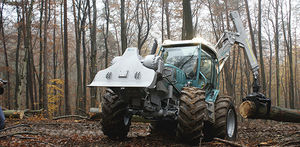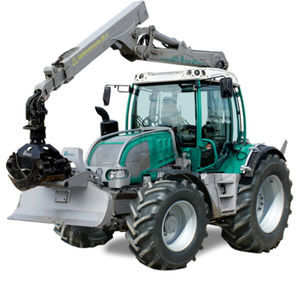
- Forestry
- Logging
- Forestry tractor
- Pfanzelt Maschinenbau GmbH
Forestry tractor Felix 4mechanical transmissionwith backhoe
Add to favorites
Compare this product
fo_shop_gate_exact_title
Characteristics
- Type
- forestry
- Transmission
- mechanical transmission
- Other characteristic
- with backhoe
- Engine power
129 kW
(175 hp)
Description
New machinery systems that are cost effective, easy on standing timber and economical while being perfectly adapted to modern work processes – these are the demands that Pfanzelt meets with its modular system.
The rear section of the 4-wheel variant of the Felix is designed for handling long timber. In the early days of mechanical timber recovery, all that was available was the cable winch. It was several years later that cranes and clam bunks were introduced, whereby the underlying machine system remained the same. Consequently all additional implements were fitted to the tail end of the machine. In order to deal with the resulting weight distribution problems, the front end of the machine was ballasted. This result into unnecessarily heavy machines – which resulted in difficulties in relation to protected the soil.
To address these issues, Pfanzelt has consistently worked on its system and adapted it to today’s requirements. A rear section with sufficient mounting space was designed so that cable winches, crane and clam bunk could be fitted. This configuration prevents the machine tipping during forwarding with heavy timber in the crane or clam bunk. At the same time, due to the optimum weight distribution, it is possible to work in the most challenging terrain while minimising damage to the ground and fuel consumption.
Another highlight is the steering system of the Felix 4-WD.
Catalogs
Product range 2016
116 Pages
Related Searches
- Wagon
- Tandem axle trailer
- Farm tractor
- Mechanical transmission farm tractor
- Trailer with hydraulic braking
- Farm tractor with cab
- Farm tractor with ROPS
- Forestry crane
- Compact farm tractor
- Forestry winch
- Tractor mounted forestry winch
- Forestry trailer
- Trailer with mechanic braking
- Loader wagon
- Mechanical forestry winch
- Trailer-mounted forestry crane
- Trailer with crane
- 16 ton trailer
- High-crop tractor
- Hydraulic forestry winch
*Prices are pre-tax. They exclude delivery charges and customs duties and do not include additional charges for installation or activation options. Prices are indicative only and may vary by country, with changes to the cost of raw materials and exchange rates.








